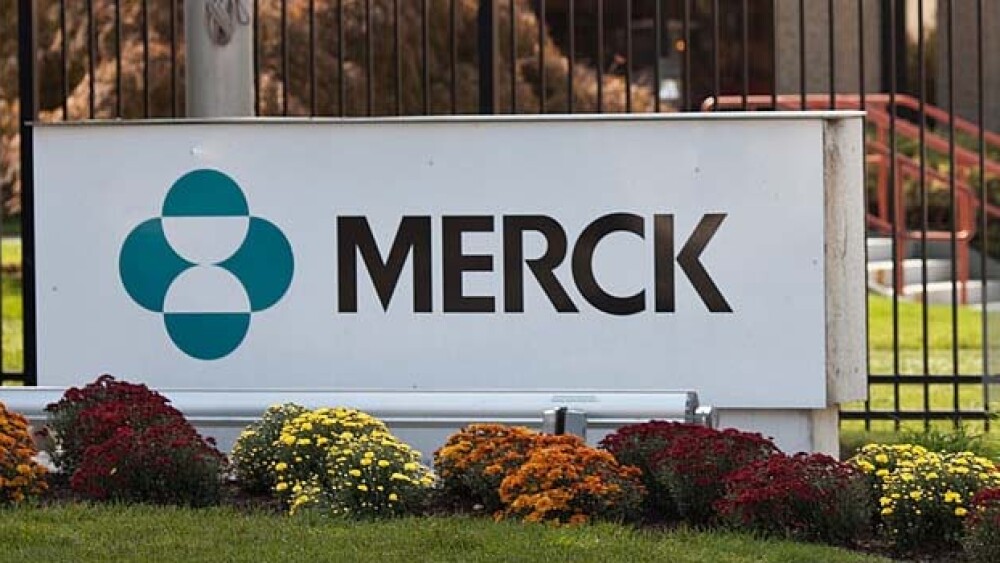Merck and Tokyo-based Eisai Co. have signed a strategic collaboration deal to develop and commercialize Lenvima with Merck’s anti-PD-1 drug Keytruda.
Merck & Company and Tokyo-based Eisai Inc. have signed a strategic collaboration deal to develop and commercialize Lenvima (lenvatinib mesylate) with Merck’s anti-PD-1 drug Keytruda (pembrolizumab).
Lenvima is an orally available tyrosine kinase inhibitor discovered and developed by Eisai. Eisai will handle Lenvima product sales worldwide as both a monotherapy and in combination, and the two companies will share gross profits equally. The drug is currently approved as a monotherapy to treat thyroid cancer, and in combination with everolimus to treat renal cell carcinoma (RCC) that has failed previous therapy. Regulatory submissions have been made for Lenvima monotherapy for hepatocellular carcinoma in Japan, the U.S., Europe, China and other countries.
Merck is paying Eisai $300 million upfront and up to $650 million for specific option rights through 2020. In addition, Merck will reimburse Eisai for $450 million in research and development expenses. Also, Eisai is eligible for up to $385 million in clinical and regulatory milestones and up to $3.97 billion for various sales milestones. These have the potential to total $5.76 billion.
“Aiming to maximize the potential of Lenvima and expedite the creation of innovative treatments in this age of ‘Cancer Evolution,’ we have entered into this collaboration with Merck who developed the anti-PD-1 antibody Keytruda,” said Haruo Naito, Eisai’s representative corporate officer and chief executive officer, in a statement. “By providing new treatment options including for refractory cancers with no hopes for a cure to date, we are striving to further contribute to increasing the benefits provided to patients and their families.”
Keytruda is currently involved in more than 700 clinical trials. The two companies will work together to develop endometrial cancer, non-small cell lung cancer, hepatocellular carcinoma, head and neck cancer, bladder cancer and melanoma, as well as other cancer types.
“It makes sense … to try to develop the drug to the full extent possible as monotherapy and in combination with Keytruda,” said Roger Perlmutter, president of Merck Research Laboratories, reported Reuters.
Reuters noted, “Eisai shares surged 10 percent on the news, with the Japanese drugmaker saying Lenvima may become a blockbuster drug generating annual sales of at least $1 billion in the year ending March 2021.”
The deal has similarities to a deal Merck made with AstraZeneca Pharmaceuticals LP for Lynparza in July 2017. Frank Clyburn, head of Merck’s commercial oncology business told Reuters, “Like the Lynparza deal with AstraZeneca, this starts to really broaden out Merck’s portfolio. And Merck will start to receive revenue right away.”
Eisai currently has Lenvima in a Phase III clinical trial to evaluate separate combinations of Lenvima with Keytruda or Lenvima with everolimus versus chemotherapy alone for treatment of RCC. The U.S. Food and Drug Administration (FDA) granted the combination Breakthrough Therapy Designation in January based on interim results from an ongoing Phase Ib/II trial that is studying the combination in select solid tumors including RCC and endometrial cancer.
“Together with Eisai, we aim to maximize the value of Lenvima for its current indications while jointly pursuing additional approvals in combination with Keytruda across a wide range of cancers,” said Perlmutter in a statement. “There is strong scientific evidence supporting synergistic effects of Keytruda when used in combination with Lenvima.”





